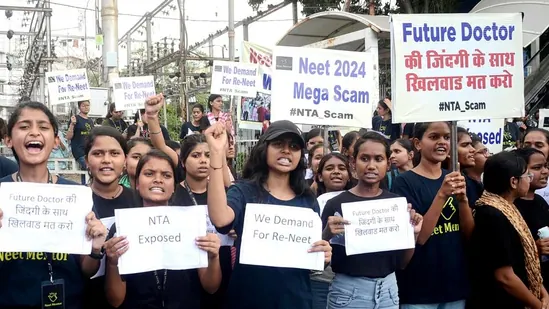NEW DELHI: A high-level committee should be formed to build political consensus to expand the National Education Policy.
Our first President, Dr. Rajendra Prasad, said at the Inter-University Board ceremony on February 28, 1950, “In my understanding, for any student, the importance lies in mental, moral, and spiritual development rather than merely intellectual achievement.” Seventy-five years after Independence, it seems that a large section of society and politics has adopted a path of personal gain and unethical practices, leading the new generation astray.
Consequently, there is uproar across the country due to irregularities in national examinations related to higher education and future employment. In the NEET exam, paper leaks, and some places where innocent students and their families were trapped by politicians, officials, and criminal gangs extorting millions of rupees, have created trouble for the future of many other students. The matter reached the Supreme Court, and numerous regional and national investigative agencies are involved in a high-level investigation. The government’s clarifications do not seem to be calming the uproar. The Congress and the opposition have found a significant issue for the Parliament session immediately following the elections.
On the other hand, the heat of the NEET scam seems to be reaching Tejashwi Yadav, former Deputy Chief Minister of Bihar and leader of the Rashtriya Janata Dal. The involvement of Pritam Yadav in the conspiracy in the NEET controversy indicates that major leaders might be involved. Pritam Yadav could not have carried out this corruption on his own without their support. In the NEET scam, Tejashwi Yadav’s PA, Pritam Yadav, who is being accused of providing rooms to the accused at the NHAI guest house, is among Tejashwi’s close associates. The BJP alleges that Pritam Yadav could not have arranged accommodation for the accused at his own level. Tejashwi Yadav might be involved in this. The party has demanded an investigation into Tejashwi Yadav’s direct role in the NEET scam. Previously, RJD leader Lalu Prasad Yadav has been accused of providing jobs in exchange for land. If any involvement of Tejashwi Yadav comes to light in this case, Rahul Gandhi’s Congress alliance will face new problems, and defending themselves in the upcoming assembly elections will become difficult.
Petitions related to NEET have been filed in the Supreme Court. In light of the NEET paper leak, there were demands for a re-exam and a stay on the results. However, the court refused to stay the results and stated that the re-exam issue would be heard in July. It is truly sad that millions of students work hard to prepare for these exams, dedicating the most valuable moments of their lives to this preparation. The entire family invests its faith and strength in this effort. Yet, year after year, issues such as paper leaks and result irregularities emerge in these exams. In fact, the opposition leaders seem to forget that the politicization of the education sector began during their own tenure. The education policy was neither properly formulated nor implemented correctly despite numerous commission recommendations. The National Testing Agency (NTA), which the Congress is attacking, was actually conceptualized and given its powers by the Congress government during its tenure from 2010 to 2013. The Modi government made budget provisions for it in 2017 and formally established it in 2018 for conducting various higher education examinations. In recent years, there have been instances of irregularities in some locations and exams.
However, this time, the involvement of leaders in the roots of the corruption and crime is becoming evident. For this, no single party can be solely blamed. More serious irregularities and corruption allegations have often arisen in state-level exams and government recruitments than in national-level exams. These too have involved corruption worth crores of rupees. Another question is why, despite significant technological advancements, entrance exams for higher education and recruitment exams for state jobs are not conducted as computer-based tests like the CAT. With computers, students would receive different questions from thousands of available ones, reducing the chances of paper leaks and preventing cheating. However, this would also disrupt the businesses of many leaders, officials, and their associated middlemen.
Now that this issue has reached the Supreme Court and Parliament, a high-level committee should be formed to build political consensus to expand the National Education Policy, which was created by the Modi government four years ago. Constitutional experts likely did not foresee that the autonomy of states would lead to severe conflicts, irregularities, and arbitrariness in the entire education system, and that the sacred domain of education would become heavily contaminated by politics. The New Education Policy is a powerful means of fulfilling the new hopes and new needs of a new India. It is the result of four to five years of hard work, with people from every sector, every discipline, and every language working on it day and night. But this work is not yet complete. In fact, the real work has just begun. Now we must implement the New Education Policy just as effectively.
Due to numerous advancements in fields such as big data, machine learning, and artificial intelligence, efforts have been made in the New Education Policy. Climate change, increasing pollution, and decreasing natural resources necessitate finding solutions to meet the needs of energy, food, water, cleanliness, etc. This also requires skilled workers in areas such as life sciences, chemistry, physics, climate science, and social sciences.
Therefore, the New Education Policy emphasises skill development. It ensures the participation of the youth in building a new India. The New Education Policy also paves the way for significant professions other than engineering, medicine, law, and management that have developed in competitive industries. The Modi government, along with the new Parliament, should collaborate with impartial justices from the current or former Supreme Court, educators, to pave a bright path for education in the future.

